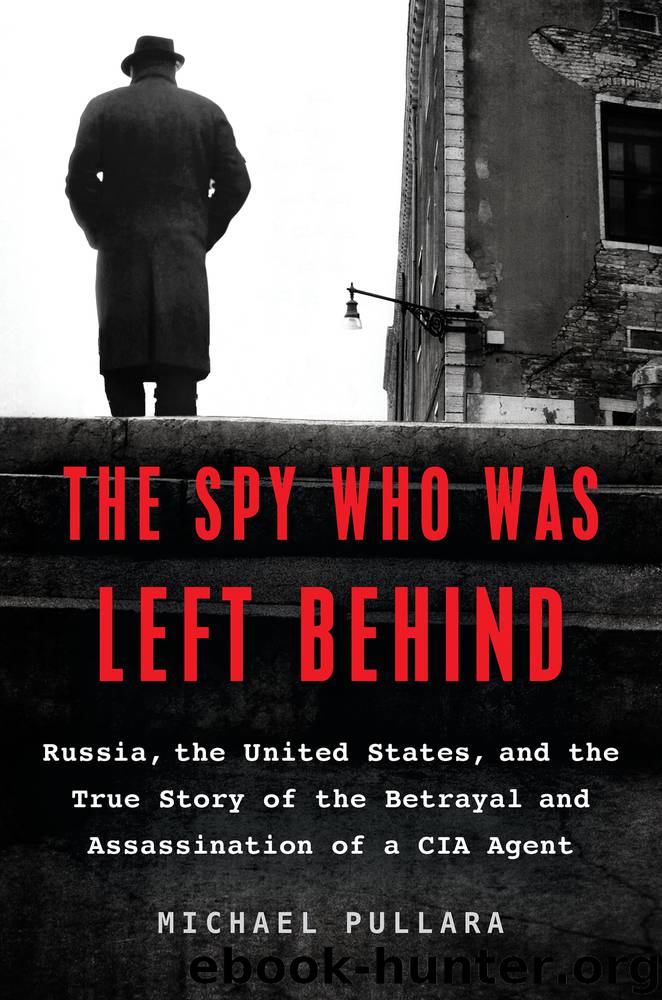The Spy Who Was Left Behind by Michael Pullara

Author:Michael Pullara
Language: eng
Format: epub
Publisher: Scribner
CHAPTER 11
* * *
A GEORGIAN EDUCATION
The day of our courtroom proceeding finally came. A TV news crew was waiting for Lali and me outside the courthouse. Waiting for me in the lobby was a stumpy peasant woman dressed all in black. Gray hair peeked out from under her headscarf. I judged her to be about sixty, but her eyes looked older. Her hands were worn and calloused. They shook as she reached toward me. She touched the hem of my coat and rubbed it gently between thumb and forefinger.
Lali gasped. “It’s Anzor’s mother,” she said.
Complex commercial litigation is a bloodless practice. It is more often than not millionaires suing billionaires over money that neither one needs for his next meal. I never meet my clients’ parents and no one ever anoints me as his or her last best hope. As a result, I wasn’t prepared for this mother’s tidal wave of adoration. I began to panic as it washed over me: a salty ocean of expectation. I hoped she would like me as much when we left.
Tamaz Inashvili was already in the courtroom. He had agreed to sit second-chair and advise me on the nuances of Georgian law and procedure. I expected the presentation to be fact-intensive and so didn’t anticipate any discussion of substantive law; nevertheless, I wanted to be prepared.
The accommodations were spare: two tables, a metal desk, a few wooden chairs. But the layout told me a lot about litigation in Georgia; there was no spectators’ gallery, no jury box, no court reporter’s desk. Georgian process occurred in relative secrecy, with no permanent record other than the final order. If a particular piece of evidence was problematic, the government-appointed judge could ignore it with impunity.
In addition, there was a noticeable dearth of symbols in the room, a complete absence of the mythic and patriotic images that define a community’s understanding of Good and Evil. There were no reminders of the struggle for human dignity, the inalienable rights of Man, or the sanctity of Law. In the absence of these tokens, the room felt less like a Temple of Justice and more like a Bus Station of Pragmatism.
All in all, the setting did not inspire confidence.
The young prosecutor—the same one with whom I’d previously met—had already arrived and was seated at the table directly in front of the judge’s metal desk. Tamaz, Lali, and I were relegated to the second table: one that was perpendicular to and to the side of the other participants.
“That’s where the prosecutor general always sits,” said Tamaz, “in the center.”
The regional judge entered the courtroom from a door behind her desk. She was young but wore her black robes comfortably and with confidence. Lali spoke first, saying that she was prepared to translate the proceedings simultaneously (Georgian to English for me and English to Georgian for everyone else). There were a few introductions and then the judge asked for opening statements.
Tamaz and I had discussed the possibility of his making a brief statement regarding the legal standard governing my client’s request to reopen the murder case.
Download
This site does not store any files on its server. We only index and link to content provided by other sites. Please contact the content providers to delete copyright contents if any and email us, we'll remove relevant links or contents immediately.
Mindhunter: Inside the FBI's Elite Serial Crime Unit by John E. Douglas & Mark Olshaker(9301)
Wiseguy by Nicholas Pileggi(5753)
Room 212 by Kate Stewart(5093)
Hitman by Howie Carr(5082)
Secrecy World by Jake Bernstein(4729)
Killers of the Flower Moon: The Osage Murders and the Birth of the FBI by David Grann(4426)
Papillon (English) by Henri Charrière(4239)
Breaking Free by Rachel Jeffs(4207)
Killers of the Flower Moon by David Grann(4025)
Say Nothing by Patrick Radden Keefe(3966)
American Kingpin by Nick Bilton(3859)
The Secret Barrister by The Secret Barrister(3681)
Molly's Game: From Hollywood's Elite to Wall Street's Billionaire Boys Club, My High-Stakes Adventure in the World of Underground Poker by Molly Bloom(3522)
Mysteries by Colin Wilson(3438)
In Cold Blood by Truman Capote(3366)
Signature in the Cell: DNA and the Evidence for Intelligent Design by Stephen C. Meyer(3118)
I'll Be Gone in the Dark by Michelle McNamara(3066)
Rogue Trader by Leeson Nick(3033)
Bunk by Kevin Young(2988)
